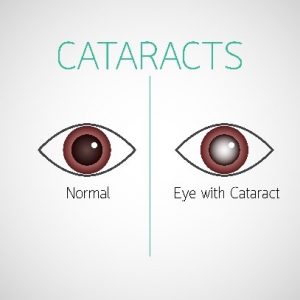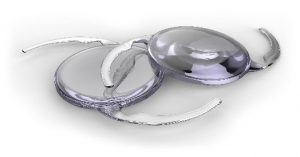Cataract Surgery Specialist in Denton, TX
 A cataract is a clouding of the eye’s natural lens. While early stages of cataracts can be managed with prescription eyeglasses, the only way to reverse the vision loss from cataracts is through surgical intervention. Cataract surgery is one of the safest and most common operations performed worldwide today. Nonetheless, if you are considering cataract surgery, it is very important that you select a cataract surgeon with the training, skill and experience necessary to successfully perform surgery.
A cataract is a clouding of the eye’s natural lens. While early stages of cataracts can be managed with prescription eyeglasses, the only way to reverse the vision loss from cataracts is through surgical intervention. Cataract surgery is one of the safest and most common operations performed worldwide today. Nonetheless, if you are considering cataract surgery, it is very important that you select a cataract surgeon with the training, skill and experience necessary to successfully perform surgery.
Patients in Denton and the surrounding area trust for all of their cataract needs and care. When working with Dr. Haq, rest assured that you will receive personalized treatment and care. The surgeon and his team will explain all your options to you and design a surgical plan tailored to your needs, lifestyle and goals of treatment.
Cataract Surgery Procedure Details
Cataract surgery involves removing the eye’s natural lens that has turned cloudy and replacing it with an artificial intraocular lens (IOL) to restore clear vision and sharp focus. Traditional cataract surgery involves using handheld instruments to create a small incision on the surface of the eye to access the capsule that holds the natural lens. The capsule is carefully opened and the lens is broken up using high-frequency ultrasound energy and removed with gentle suction. The natural lens is replaced with an artificial IOL.
The incisions made during cataract surgery typically seal themselves over time. Most patients are able to resume normal activities soon after surgery.
Intraocular Lens Options
Dr. Haq offers a full range of artificial intraocular lenses to accommodate the diverse needs of our patient population. To help you select the right IOL, Dr. Haq and his team will take measurements of your eye and vision, and administer tests as needed to determine the appropriate IOL. Other information, including your lifestyle and visual goals, will also be considered.
Monofocal IOL
Standard cataract surgery involves removing the natural lens that has become cloudy and replacing it with a standard monofocal IOL. Monofocal IOLs restore vision at a single fixed distance — either near, intermediate or far. Most monofocal IOL patients choose to have their vision corrected to see clearly at far distances and wear reading glasses to see up close.
Extended Range and Multifocal IOLs
Custom cataract surgery uses premium IOLs, also known as lifestyle IOLs, to correct vision loss caused by cataracts as well as address other visual conditions, including presbyopia (the age-related loss of near/reading vision). Extended range and multifocal IOLs restore vision at multiple distances (near, intermediate and far) after cataract surgery. The lenses have different zones set at different focusing powers, and the brain learns to select the right focus over time. Some cataract patients select extended range or multifocal IOLs to correct presbyopia and reduce dependence on reading eyeglasses, while others select a multifocal lens that is tailored for intermediate distances. This type of IOL is optimized for individuals favoring intermediate vision activities like grocery shopping and computer work, while maintaining comparable near and distance visual acuity. Numerous studies have found positive results with intermediate-focused IOLs. Contact us today to learn more about the benefits of these lenses.
Dr. Haq offers two leading-edge multifocal lenses: the Tecnis Symfony and the AcrySof ReSTOR. Both of these multifocal lenses provide continuous high quality vision for distance, mid-range and near vision.
Toric IOL
 Toric IOLs restore vision after cataract surgery and correct astigmatism, a refractive error caused by an irregularly shaped cornea. Like extended range and multifocal IOLs, toric lenses possess different powers in different areas. Dr. Haq offers a monofocal Toric as well as both the ReSTOR Toric and Symfony Toric IOL for astigmatic cataract patients.
Toric IOLs restore vision after cataract surgery and correct astigmatism, a refractive error caused by an irregularly shaped cornea. Like extended range and multifocal IOLs, toric lenses possess different powers in different areas. Dr. Haq offers a monofocal Toric as well as both the ReSTOR Toric and Symfony Toric IOL for astigmatic cataract patients.
If you have been diagnosed with cataracts or suspect that your visual symptoms are a result of the eye disease, it’s time to consider your treatment options. Schedule a consultation with Dr. Haq by calling (940) 323-2020 or emailing our office today.